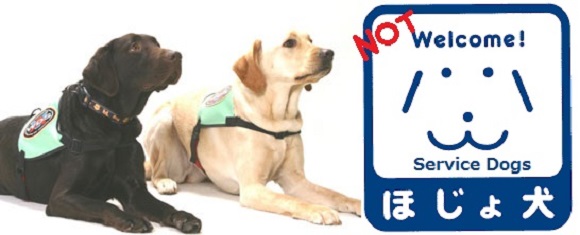
It was Saturday, October 3 when a hearing-impaired woman and her service dog, a hearing dog for the deaf, attended an event promoting the awareness of service dogs at the Hankyu department store at Hankyu-Umeda Station in Osaka. After the event, the unnamed woman, her dog, and a friend went for a bite to eat at one of the restaurants located inside the same department store on the same floor as the event. Ironically enough, and much to the surprise of the woman, a member of staff stopped her from entering the restaurant, stating that animals were not allowed inside.
The woman’s friend pulled out a guidebook about hearing dogs for the deaf, trying to explain that the dog wasn’t a pet but an animal trained to assist its owner. The staff still refused, however, and the pair finally gave up and went elsewhere, thinking that it must have just been an unfortunate misunderstanding. Perhaps this was just one uninformed staff member who didn’t realize service animals are actually allowed in public places, they thought.
But even at the next restaurant they were turned away yet again…
Just like in numerous other countries, Japan has laws which state that individuals with guide, hearing, or mobility dogs may not be denied access to any facility open to the general public such as hotels, public transportation, and yes, even restaurants. The Access Law for Service Dogs was passed in Japan in 2002, just over a decade after the United States’ Americans with Disabilities Act of 1990, which included laws protecting access rights for people with assistance dogs.
▼ Hearing dogs are trained to alert their owners to a number of sounds, including doorbells, alarm clocks, ringing phones, crying children, and more.
Still, more than 10 years after the legislation was passed, there are many who are still unaware of the law’s existence (or who possibly deny access to service dogs in spite of the law).
The woman with her hearing dog and friend were finally allowed into the third restaurant they tried. This wasn’t the first occasion she had been turned away from a public establishment because of her service dog, yet it was particularly crushing for her as the service dog awareness event had just been held in the same department store and on the very same floor where the restaurants were located. It seems that maybe a couple of people who didn’t attend the event should have.
Unfortunately, this kind of thing is far more common than it should be. According to an article by ZENOAQ:
“The Japan Guide Dog Association conducted a survey in 2004 asking random members of the public about legal access rights for service dog users.
Of approximately 500 people who replied, nearly half were unaware of the law passed to protect these rights. Under the current access law, public buildings, public transportation, and facilities open to the general public, such as stores and hotels, may not deny access to people with guide dogs, hearing dogs, and mobility dogs.
Recently, 100 guide dog users were interviewed to assess the current situation. 52 stated that they had experienced denial of access at some time even after the passing of the aforementioned law. Of those facilities that refused entry, restaurants ranked the highest at 32, followed by taxis, hotels (mainly Japanese-style inns), and privately owned hospitals…”
Yes, the survey was conducted only two years after the law had passed, but the fact that it is still happening more than 10 years later is rather disconcerting.
In addition to apologizing directly to the woman concerned, on October 7, the Hankyu Department Store posted an official apology on their homepage, promising to retrain their staff and take other necessary measures to ensure the same thing does not happen again.
The woman says even though she was hurt by the experience, she will continue to spread the word in order to ensure others with service dogs will not have to go through the same thing.
In addition, I personally feel that companies should be required to properly train their employees and inform them of the laws, and the government should be more proactive in establishing ways for people to file claims when they are discriminated against, and take appropriate action against the offending party to ensure that its disabled citizens are given the same treatment and accessibility as every other citizen.
Now, tell us what you think. What other ways can Japan raise awareness to ensure situations like this don’t continue to happen?
Source: grape
Top image: AWDSA homepage, Hokkaido Prefecture homepage (edited by RocketNews24)